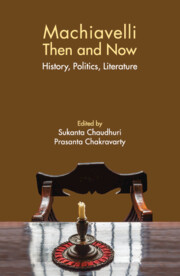14 - A Language for Politics and a Language of Politics: Words as a Tool of Understanding and of Action in Machiavelli
Published online by Cambridge University Press: 21 January 2022
Summary
Towards a Semantic History of Politics: A Proposal for a Political Philology
Machiavelli employs a language that is at once unique and embedded in a particular ‘quality of the times’ (‘le qualità de’ tempi’, in his own phrase). This language originates in the interaction of heterogeneous cultural and semantic traditions: the legal, the medical, the scientific, as also the languages of commerce, of the Chancery, and of the new politics of the time. For this reason, I plan to dwell on the time to which the words belong, and on the uses to which Machiavelli puts them, rejecting all aprioristic methods.
I will base my study on a simple historical factor: Machiavelli—to start with the obvious—is, above all, someone who speaks and writes in order to do politics. Hence, the language I will consider is a language conceived for politics: a language that is politics in the first place, and then, only secondarily, a language of politics, from politics, and, eventually, a language about politics. My aim is to examine the effects of Machiavelli's choice of words in order to assign them a precise status: a status that is strictly and eminently political, and dependent on a political situation. The linguistic, rhetorical, or gnoseological status of words is obviously present and operative as well, but eventually subsidiary.
On a larger scale, for the Florentine people belonging to the ‘war generation’, words no longer hold a central place in individual and collective thought. Facts and their effects are what matter in the first instance; the only relevant question about words concerns their efficacy in representing those facts and reporting or inducing those effects. These are the two fundamental conditions for words to become political. We are encountering an unprecedented rhetorical approach, though to grasp this, we must depart from the teachings of mainstream humanism in the fifteenth century. In particular, we should no longer think in terms of a value or privilege accorded to a re-invented language that directly imitates both the words (signs) and the things (referents) derived from the Ancients.
Rather, we should focus on the understanding of modern issues and the adaptation of language to aid that understanding.
Information
- Type
- Chapter
- Information
- Machiavelli Then and NowHistory, Politics, Literature, pp. 262 - 278Publisher: Cambridge University PressPrint publication year: 2022
